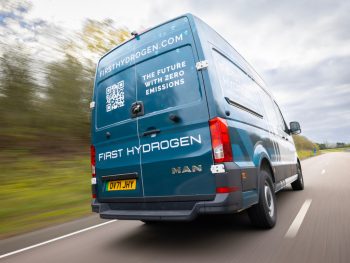Parcel delivery fleets to trial hydrogen fuel cell vans
First Hydrogen is opening up fleet trials for its hydrogen fuel cell-powered vehicle (FCEV) to enable parcel delivery companies to get behind the wheel.

First Hydrogen’s proof-of-concept demonstrator vehicles will start operational trials with several parcel delivery companies in late Q3 and Q4 this year
Its proof-of-concept demonstrator vehicles will start operational trials with several parcel delivery companies in late Q3 and Q4 of this year, supporting the switch to greener fleets.
So far, First Hydrogen’s trials have been targeted at targeted industries such as utilities, that require zero-emission vehicles with the capability to travel further and carry heavier payloads.
But the company says parcel delivery companies face a specific set of challenges, pushing them to explore other zero-emission vehicles in addition to battery technology to meet commercial and environmental targets.
These fleets make up the middle and final stages of the supply chain, which traditionally handle shorter journeys to transport items from local hubs directly to consumers or end users. They are increasingly undertaking longer routes from distribution centre to lockers and shops with parcel collection services or ‘pick-up and drop-off points’. This so-called locker model is said to create two-thirds less carbon than conventional home deliveries and greener vehicles could slash this further.
First Hydrogen’s vans are equipped with hybrid engines (hydrogen fuel cell and battery), which suit shorter drives in urban and suburban areas as well as being able to sustain longer journeys. Regenerative braking helps to recharge the battery, particularly during journeys with lots of starts and stops, such as driving in built-up areas, or routes with multiple stops – including the journeys delivery drivers make with frequent drop-offs and pick-ups.
Fast hydrogen refuelling also reduces vehicle downtime compared to fully electric vehicles. Refuelling First Hydrogen’s LCV takes approximately five minutes, ensuring the vehicles are available for longer shifts across multiple drivers, which provides fleets with greater operational flexibility.
Steve Gill, CEO of First Hydrogen Automotive, said: “Fleet managers are realising that battery electric vehicles alone will not provide the reliability and operational flexibility required to meet customer demands. Future fleets require a mix of BEV and FCEV to overcome these obstacles and hit net zero targets. The large, growing parcel delivery sector desperately needs to build environmentally friendly and commercially viable fleets, and our hydrogen LCV can help to do that. This presents us with an exciting opportunity to explore a new customer base, enabling us to further accelerate business growth and potentially bring our vehicles to market quicker.”












